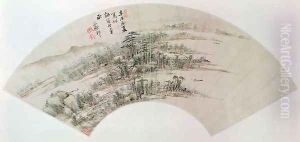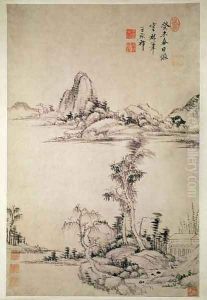Yuan-Chi Wang Paintings
Yuan-Chi Wang was a prominent Chinese-American artist and educator known for his contributions to the development of modern art in the United States and Taiwan. Born in 1919 in Beijing, China, Wang was deeply influenced by the cultural and political changes happening in China during his early years. He received his initial education in the arts in China, where he was exposed to both traditional Chinese painting techniques and the burgeoning influence of Western art forms. This dual influence would become a hallmark of his later work, which often sought to bridge Eastern and Western artistic traditions.
Wang moved to the United States in the mid-20th century, a period that saw significant cultural exchange between the East and the West. He pursued further studies in art, receiving advanced degrees from prestigious institutions. His time in the United States allowed him to immerse himself in the American art scene, where he absorbed elements of Abstract Expressionism, a movement that profoundly influenced his approach to painting.
Throughout his career, Yuan-Chi Wang was known for his unique style that combined the calligraphic and philosophical depth of Chinese painting with the bold colors and dynamic forms of Western abstract art. He was a prolific painter, and his works were exhibited in numerous galleries and museums around the world, earning him international recognition. Wang was also a dedicated educator, passionately committed to teaching and inspiring a new generation of artists. He held faculty positions at several esteemed universities, where he taught courses on both Eastern and Western art forms, emphasizing the importance of cultural exchange and innovation in art.
In addition to his painting and teaching, Wang wrote extensively on art theory and criticism, contributing valuable insights into the dialogue between different art traditions. His writings and lectures often explored the concept of cultural identity in art, advocating for a more inclusive understanding of artistic expression that transcends national or cultural boundaries.
Yuan-Chi Wang passed away in 2002, leaving behind a rich legacy that continues to influence the fields of art and education. His work remains a testament to the power of cross-cultural dialogue in the creation of new artistic expressions, bridging the gap between East and West and offering a unique perspective on the global art landscape.

